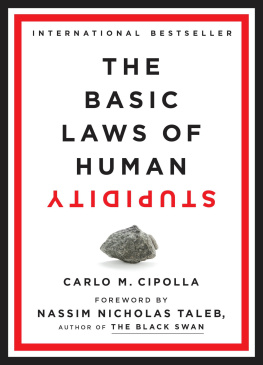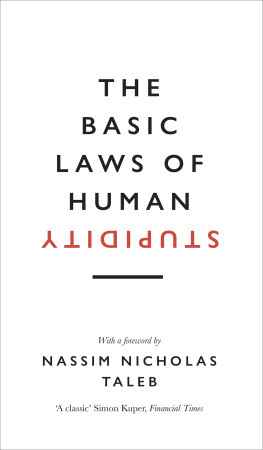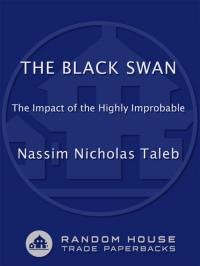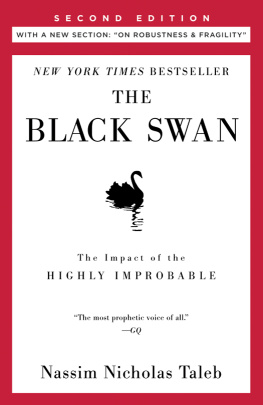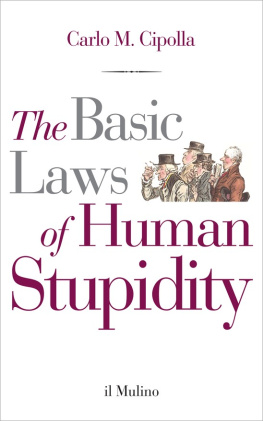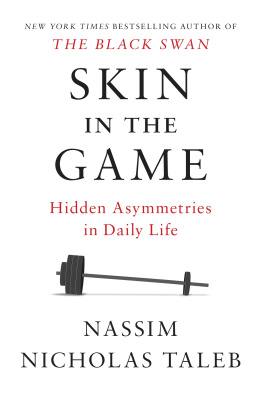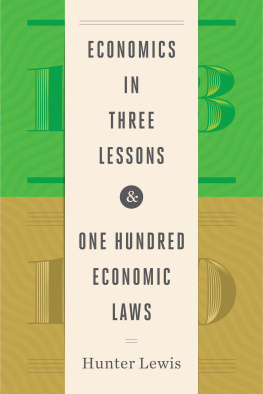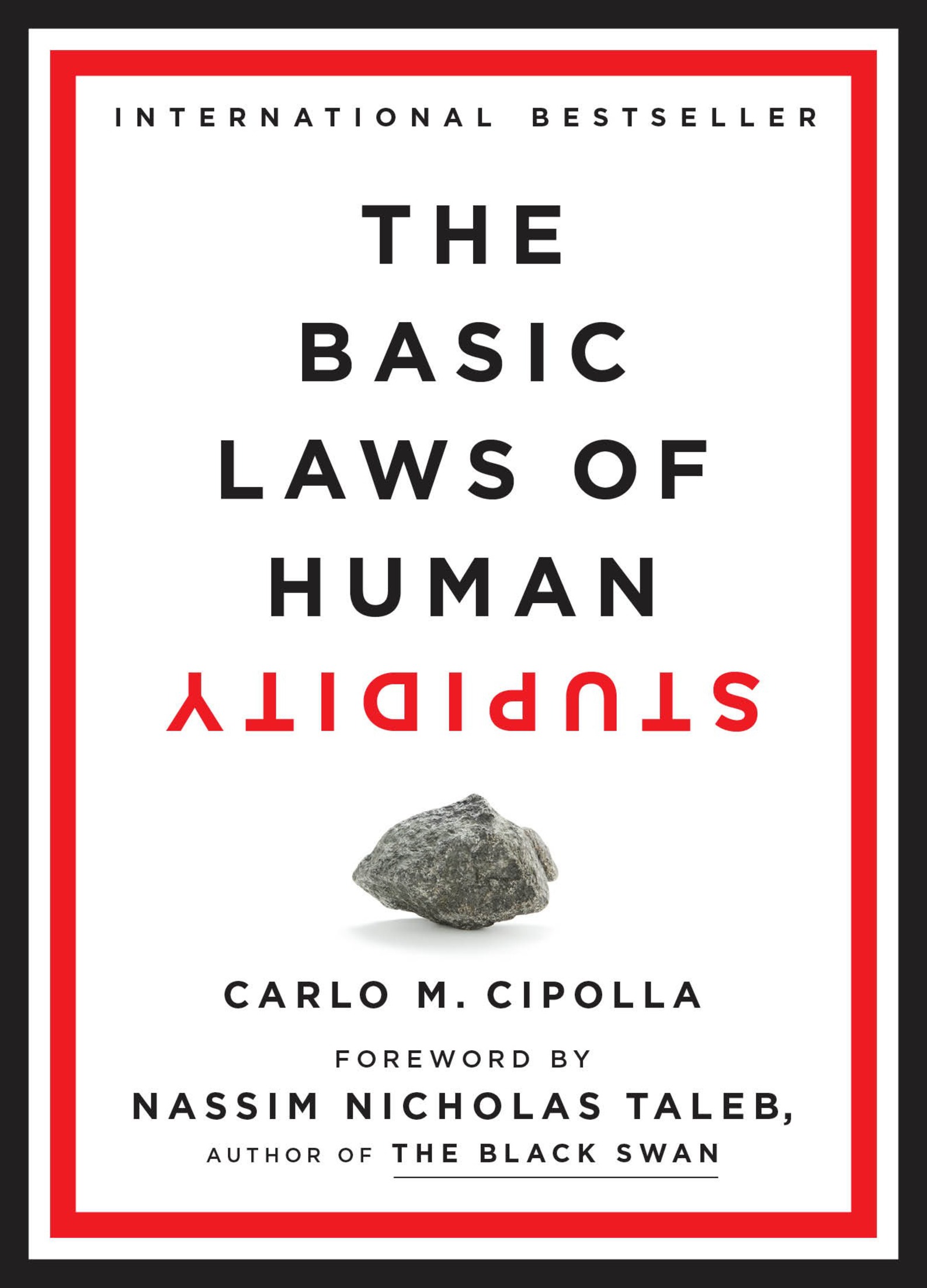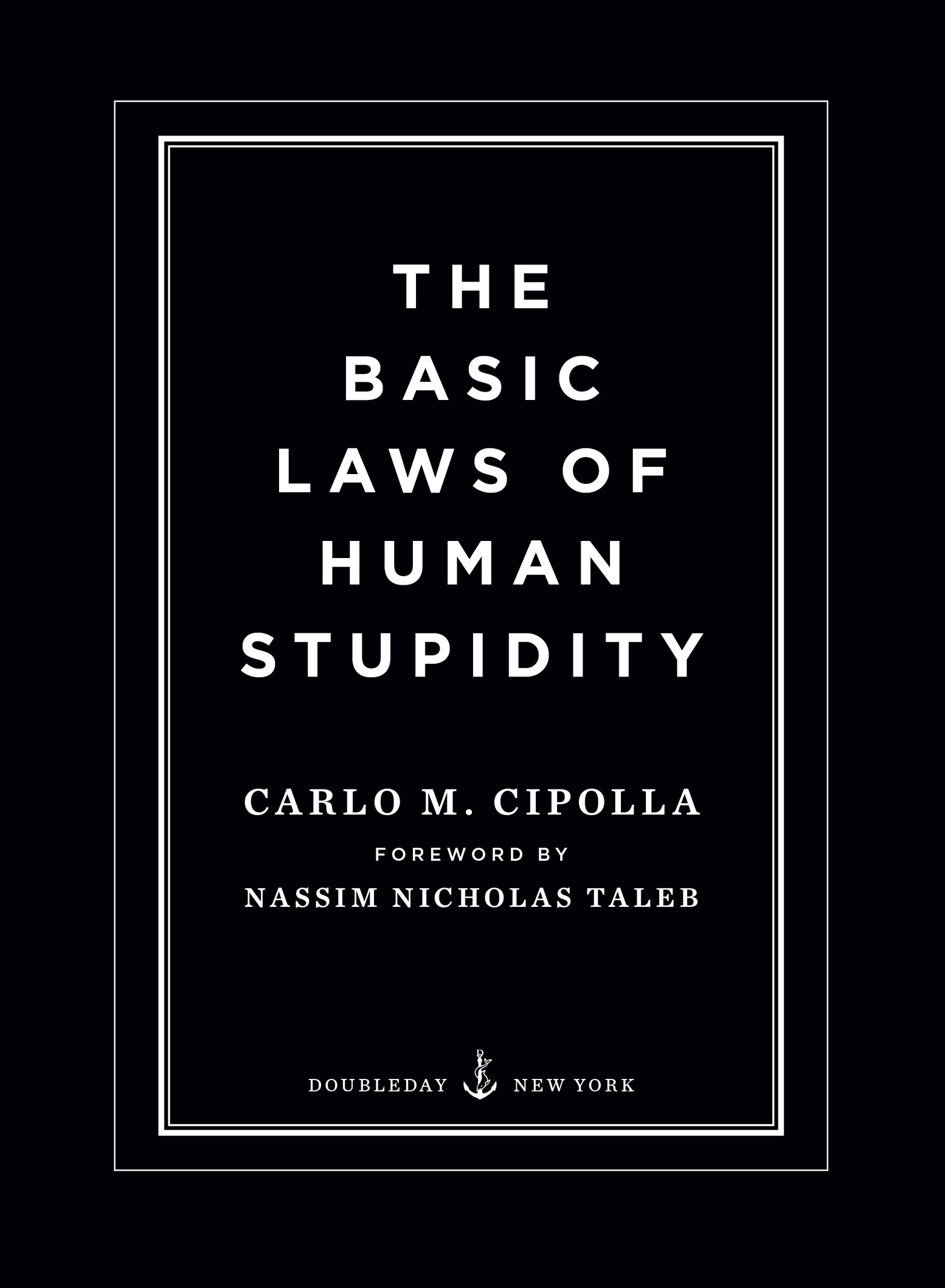from
THE BASIC
LAWS OF HUMAN
STUPIDITY
Law #1: Always and inevitably everyone underestimates the number of stupid individuals in circulation.
Law #2: The probability that a certain person be stupid is independent of any other characteristic of that person.
Law #3: A stupid person is a person who causes losses to another person or to a group of persons while himself deriving no gain and even possibly incurring losses.
Law #4: Non-stupid people always underestimate the damaging power of stupid individuals. In particular non-stupid people constantly forget that at all times and places and under any circumstances to deal and/or associate with stupid people infallibly turns out to be a costly mistake.
Law #5: A stupid person is the most dangerous type of person. A stupid person is more dangerous than a bandit.
Copyright 2011 by Societ editrice il Mulino Spa
Introduction copyright 2019 by Nassim Nicholas Taleb
All rights reserved. Published in the United States by Doubleday, a division of Penguin Random House LLC, New York, and in Canada by Penguin Random House Canada Limited, Toronto. Originally published in Italy as Le leggi fondamentali della stupidit umana by Societ editrice il Mulino, Bologna, in 1988. Copyright 1988 by Societ editrice il Mulino, Bologna. Originally published in English as The Basic Laws of Human Stupidity by Societ editrice il Mulino, Bologna, in 2011, and subsequently in Great Britain by WH Allen, an imprint of Ebury Publishing, a division of Penguin Random House Ltd., London, in 2019. This edition published by arrangement with WH Allen, a division of Penguin Random House Ltd., London.
An earlier version of The Basic Laws of Human Stupidity was self-published in Italy by Carlo M. Cipolla and privately available in 1976.
www.doubleday.com
DOUBLEDAY and the portrayal of an anchor with a dolphin are registered trademarks of Penguin Random House LLC.
Cover photograph by CribbVisuals / E+ / Getty Images
Cover design by John Fontana
Library of Congress Cataloging-in-Publication Data
Names: Cipolla, Carlo M., author. | Taleb, Nassim Nicholas, [date]- writer of foreword.
Title: The basic laws of human stupidity / Carlo M. Cipolla ; with a foreword by Nassim Nicholas Taleb.
Other titles: Leggi fondamentali della stupidita umana. English.
Description: London : WH Allen, 2019. | The Basic Laws of Human Stupidity was originally published in Italian in 1988 by Societa editrice il Mulino. First published in English by Societa editrice il Mulino. 2011 by Societa editrice il Mulino, Bologna.
Identifiers: LCCN 2019047891 (print) | LCCN 2019047892 (ebook) | ISBN 9780385546478 (hardcover) | ISBN 9780385546485 (ebook)
Subjects: LCSH: StupidityHumor. | Conduct of lifeHumor.
Classification: LCC PN6231.S77 C5713 2019 (print) | LCC PN6231.S77 (ebook) | DDC 857/.92dc23
LC record available at https://lccn.loc.gov/2019047891
LC ebook record available at https://lccn.loc.gov/2019047892
Ebook ISBN9780385546485
ep_prh_5.6.1_c0_r0
CONTENTS
FOREWORD
NASSIM NICHOLAS TALEB
When I start at the top left corner of a page in The Basic Laws of Human Stupidity, I have the feeling of reading a satire. Ten lines into it, some doubts eruptcould this be serious? When I reach the bottom right corner, I am certain it must be a serious work of scholarship in economic analysis. Then, upon turning the page, the cycle starts again, thankfully, because economics is boring (by design) and this is playful, hence fun to read.
The Basic Laws asserts that 1) there will always be more stupid people than you think; 2) the proportion of stupid people is invariant to intellectual, social or geographic segmentation. The ratio will be the same among Nobel Prize winners as it will be among a selection of tax accountants (except I am sure that there must be a higher prevalence among laureates of the pseudo-Nobel in economics). I will leave the remaining laws to avoid spoiling the readthis is a very short book.
By the time my eyes reach the bottom right corner, and I realize this is not a joke, the following ideas pop into my head. First, the author has a formal axiomatic definition of what stupid means: someone who harms others without procuring any gain for himself or herselfin contrast to the much more predictable bandit who gains something from harming you. As such, stupid persons can cause a lot of damageunlike bandits, they have no interest in the survival of the system because they do not benefit from their stupidity. Second, the laws here are real laws, as far as economic laws are concerned, no less rigorously obtained than Adam Smiths three laws, the law of diminishing return, Okuns law, or some such thing you forget about seconds after taking the final exam. (By contrast, I promise that you will remember Cipollas laws forever.)
Finally, one wonders: Why is there a constant proportion of stupid people, invariant to time, place, geography, profession, body mass index, degrees of separation from the Queen of Denmark and professional rank? The solution to the mystery may lie in the Italian title of Cipollas work, Allegro ma non troppo. Fast, but not too fast. Could it be that Mother Nature (or God, whatever your theology) wants to put a brake on things, reduce the speed of progress, slow down the growth of your employer, prevent GDP from an exponential rise so the economy doesnt overheat? So She created the stupid person acting against both his and the collective interest to do just that?
A masterly book.
PUBLISHERS NOTE
Originally written in English, The Basic Laws of Human Stupidity was published for the first time in 1976 in a numbered and private edition bearing the unlikely imprint of Mad Millers.
The author believed that his short essay could be fully appreciated only in the language in which it had been written. He consequently long declined any proposal to have it translated. Only in 1988 did he accept the idea of its publication in an Italian version as part of the volume titled Allegro ma non troppo, together with the essay Pepper, Wine (and Wool) as the Dynamic Factors of the Social and Economic Development of the Middle Ages, also originally written in English and published privately by Mad Millers for Christmas 1973.
Allegro ma non troppo has been a bestseller both in Italy and in all the countries where translated versions have appeared. Yet, with an irony that the author of these laws would have appreciated, it has never been published in the language in which it was first written.
Thus, more than a quarter of a century since the publication of Allegro ma non troppo, this in fact is the first edition that makes The Basic Laws of Human Stupidity available in its original version.
THE MAD MILLERS
TO THE READER
The private edition of 1976 was preceded by the following publishers note written by the author himself:
The Mad Millers printed only a limited number of copies of this book, which addresses itself not to stupid people but to those who on occasion have to deal with such people. To add that none of those who will receive this book can possibly fall in area

